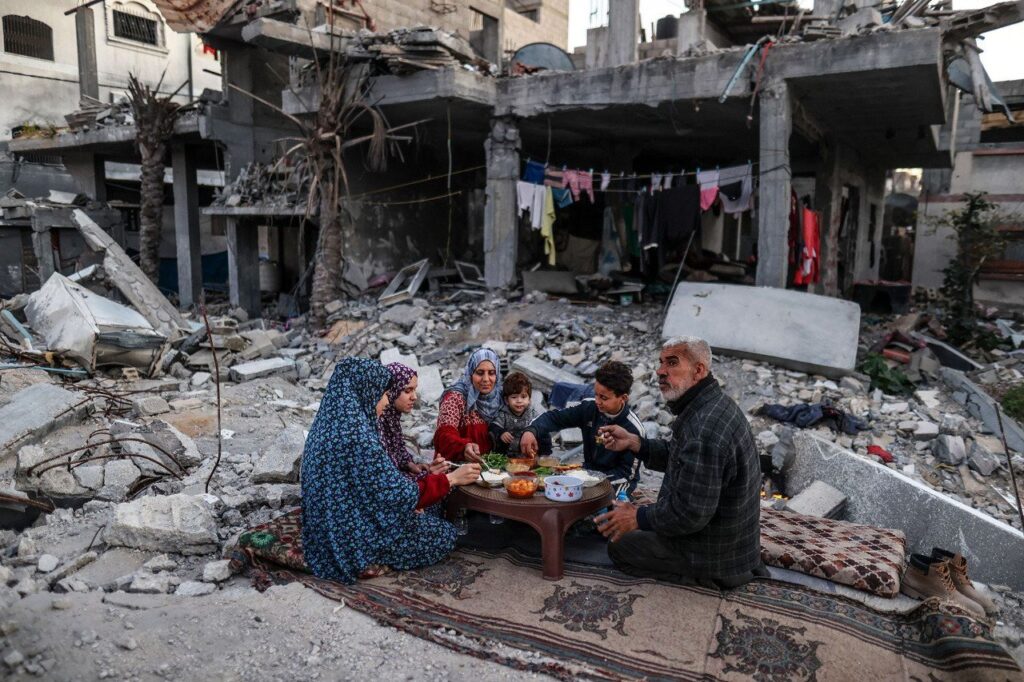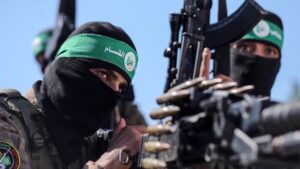Embodiment of resilience and Ramadan in Gaza

Ramadan is the ninth and most sacred month of the Islamic calendar. Muslims around the world fast during daylight hours. As the sunset call to prayer is heard, families who decorate their homes with lights during Ramadan, gather to break their fast with a variety of traditional food.
But the situation is completely different in the Gaza Strip where people are losing their lives not only due to Israeli strikes but also hunger.
Israel has killed more than 31,500 people in Gaza since launching war on the small territory on October 7. Tens of thousands of others have also been wounded.
Soon after the war began, Israel imposed a total siege on Gaza and largely limited the entry of food, water, medicines and other essential supplies.
Aid groups and UN agencies have repeatedly warned of a looming famine in Gaza amid severe food shortages.
UN experts have also accused Israel of deliberately starving Palestinians in Gaza.
Many Gazans who have been starving for months, are observing the fast in Ramadan as a testament to their unwavering faith during profound hardship while having no access to the quality food and clean water.
The situation in northern Gaza is worse because it has been isolated from other parts of the territory by Israel. Some people have resorted to grinding animal feed into flour to survive.
Israel has allowed a trickle of aid trucks to enter northern Gaza. But the regime’s forces have fatally opened fire on those who wait for deliveries of food from these trucks.
On Thursday, at least 20 people were killed and more than 150 others wounded by the Israeli shelling as they waited for desperately needed food at the Kuwaiti Roundabout in Gaza City.
Late last month, Israeli forces also massacred over 100 aid seekers in a Gaza City neighborhood which triggered global backlash.
Officials in Gaza say at least 400 people have been killed in several similar incidents since early October.
The U.S. and some of its allies have been airdropping food into Gaza and placed plans on the agenda to get food into Gaza by sea. But aid groups have described such moves as distractions from Israel’s prevention of aid via land crossings. They believe such methods are a poor substitute for the delivery of aid from ground routes.
‘Beyond catastrophic’
The head of the International Federation of Red Cross and Red Crescent Societies has painted a gloomy picture of the humanitarian situation in Gaza as people are observing the fasting month.
“An escalating food crisis exacerbates an already dire situation. As Ramadan starts, countless people have nothing to break their fast with,” Jagan Chapagain wrote on X.
He added, “The humanitarian situation in Gaza is beyond catastrophic. Civilians are still facing an unprecedented level of indignity, misery, and suffering. The healthcare situation is on the brink of collapse with hospitals facing desperate conditions.”
Acute malnourishment
The United Nations Palestinian refugee agency has also issued a stern warning over the dire condition of kids in Gaza.
“1 in 3 children under 2 years of age are now acutely malnourished in northern #Gaza. Children’s malnutrition is spreading fast and reaching unprecedented levels in #Gaza.
Famine is looming. There is no time to waste,” UNRWA wrote on X.
Health officials in Gaza say more than two dozen people have starved to death in Gaza.
Palestinians have time and again condemned Israel’s use of starvation as a weapon.
Israel’s Western allies have admitted that the regime has resorted to such reprehensible actions.
European Union foreign policy chief Josep Borrel recently acknowledged that starvation is being used as a weapon of war in Gaza.
The Israeli army has reduced much of Gaza to rubble and hampered efforts to deliver aid over the past months.
Despite harsh conditions, Palestinians in the territory fast in Ramadan.
Even before the holy month, they were forced to fast because they did not have enough food.
Now, the only difference is that the fast has been scheduled.
International humanitarian law prohibits the starvation of civilians as a method of warfare.
According to the Rome Statute of the International Criminal Court, intentionally starving civilians by depriving them of objects indispensable to their survival, including willfully impeding relief supplies, amounts to a war crime.
Undoubtedly, the plight of the Palestinians in Gaza is a disgrace to the U.S. and some other Western countries. This is because they continue to provide military and political support to Israel despite the atrocities and massacres that the regime is perpetrating in the besieged territory.
(TEHRAN TIMES)








